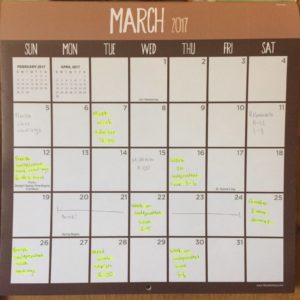
It’s halfway through the semester now and the deadline for junior papers and theses is quickly approaching. Since we’ve just had midterms and are now facing another six weeks of hard work, it’s no wonder campus-wide motivation is at an all-time low. You may even be starting to fall behind on your independent work (like me!). But if you’re worried about how to keep holding yourself accountable, there’s still hope! Out of the several options available, I’ve come up with three simple steps for a quick solution. Here’s how taking 20-30 minutes today will help set you up for the rest of your independent project this spring:
Schedule Work Time
While it’s tempting to tell yourself you’ll just do independent work in your free time, if you’re like me, this leads you to doing anything but work and feeling more stressed later on. One solution to this dilemma is to treat your independent work like a class and to schedule regular times to focus on it. Although it may seem painful to add more to your already packed calendars, I’ve found that setting up an independent work schedule not only helps me be more productive during work periods, but also allows me to actually relax during my down time.
Short-term Goals
In addition to setting aside time to do independent work, setting up small goals can make the idea of completing a 50 to 100-page paper less daunting. For example, I have a different deadline for the end of every week this month for tasks such as gathering sources, reading new materials, and writing new sections of my paper. And if setting up personal deadlines isn’t enough, creating them with a friend can give you a work partner as well as someone to hold you accountable.
Regular Adviser Meetings
We all know that there’s nothing worse than meeting up with your adviser only to say that you haven’t made any progress. Consequently, setting up a weekly or biweekly meeting with him or her can be a great motivator. Not only will these check-ins help you stay on top of your work, but they’ll also provide you with many opportunities to ask questions and get feedback.
As mentioned before, these are only three of many strategies for keeping up with your independent work. The McGraw Center is another great resource for finding more ideas and talking with a Peer Academic Adviser or Peer Health Adviser can be helpful, too. But whatever option you choose, know that even if you experience a few setbacks, you’re going to make it through your independent work and there are plenty of ways to do it!
— Taylor Griffith, Social Sciences Correspondent

